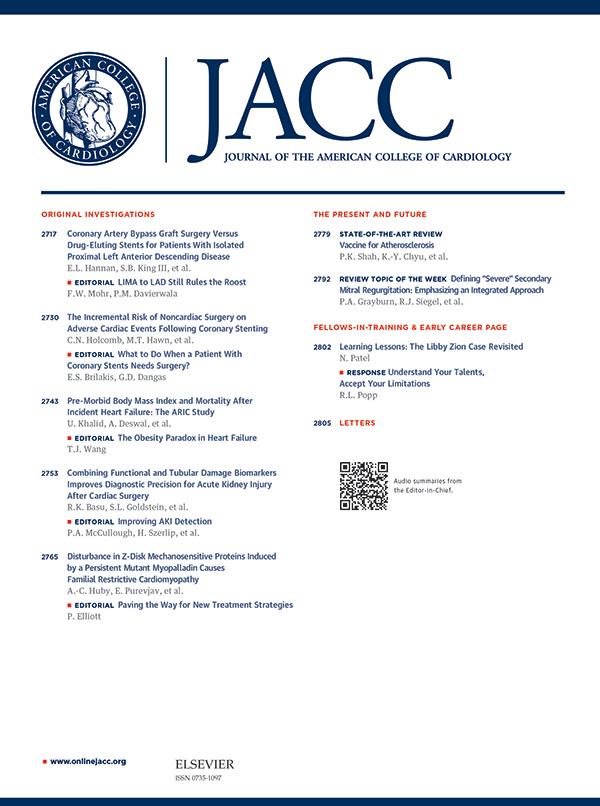Angiopoietin-Like 3 Antibody Therapy in Patients With Suboptimally Controlled Hyperlipidemia: A Phase 2 Study
IF 21.7
1区 医学
Q1 CARDIAC & CARDIOVASCULAR SYSTEMS
引用次数: 0
Abstract
Background
Angiopoietin-like 3 (ANGPTL-3) inhibits the activity of lipoprotein lipase and endothelial lipase, increasing both serum low-density lipoprotein cholesterol (LDL-C) and triglyceride (TG) levels. SHR-1918 is a fully human monoclonal antibody against ANGPTL-3.Objectives
The aim of this study was to assess the lipid-altering efficacy and safety of SHR-1918 in patients at moderate or higher risk of atherosclerotic cardiovascular disease (ASCVD) with suboptimally controlled hyperlipidemia.Methods
A multicenter, randomized, double-blind, placebo-controlled, dose-escalation phase 2 study was designed to evaluate the effects of SHR-1918 in hypercholesterolemic patients, who did not achieve optimal LDL-C after 4 to 8 weeks of standard lipid-lowering therapies. A total of 333 patients were enrolled sequentially into 1 of 8 dose cohorts at a 4:1 (active/placebo) ratio. Patients received subcutaneous SHR-1918 at doses of 150, 300, or 600 mg every 4 weeks (Q4W), or SHR-1918 at a dose of 600 mg every 8 weeks (Q8W), alternating with placebo for a total treatment period of 16 weeks. The extension treatment included subcutaneous SHR-1918 at a dose of 150, 300, or 600 mg Q4W over 36 weeks, or SHR-1918 a dose of 600 mg Q8W over 40 weeks and then followed for safety. Prespecified endpoints included percentage change from baseline in LDL-C and TG. Safety was assessed with laboratory test results and by the incidence and severity of adverse events.Results
SHR-1918 demonstrated a clear dose-response relationship with respect to percentage LDL-C lowering for both Q4W and Q8W administration: 21.7%, 27.3%, and 29.9% with 150, 300, and 600 mg Q4W compared with placebo, respectively, and 22.5% with 600 mg Q8W compared with placebo. SHR-1918 also substantially reduced TG, non–high-density lipoprotein cholesterol, apolipoprotein B, and apolipoprotein A1, with a better achievement of LDL-C targets. SHR-1918 was generally well-tolerated.Conclusions
Based on standard lipid-lowering therapy, ANGPTL-3 inhibition with SHR-1918 further reduces LDL-C by 21.7% to 29.9% in patients at moderate or higher risk of ASCVD. These additional reductions are both dose and dosing frequency dependent. (Evaluate the Efficacy and Safety of SHR-1918 in Patients With Hyperlipidemic; NCT06109831)

求助全文
约1分钟内获得全文
求助全文
来源期刊
CiteScore
42.70
自引率
3.30%
发文量
5097
审稿时长
2-4 weeks
期刊介绍:
The Journal of the American College of Cardiology (JACC) publishes peer-reviewed articles highlighting all aspects of cardiovascular disease, including original clinical studies, experimental investigations with clear clinical relevance, state-of-the-art papers and viewpoints.
Content Profile:
-Original Investigations
-JACC State-of-the-Art Reviews
-JACC Review Topics of the Week
-Guidelines & Clinical Documents
-JACC Guideline Comparisons
-JACC Scientific Expert Panels
-Cardiovascular Medicine & Society
-Editorial Comments (accompanying every Original Investigation)
-Research Letters
-Fellows-in-Training/Early Career Professional Pages
-Editor’s Pages from the Editor-in-Chief or other invited thought leaders

 求助内容:
求助内容: 应助结果提醒方式:
应助结果提醒方式:


